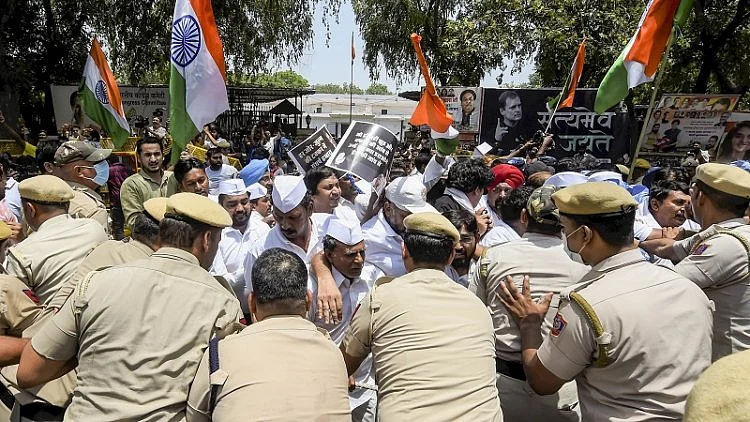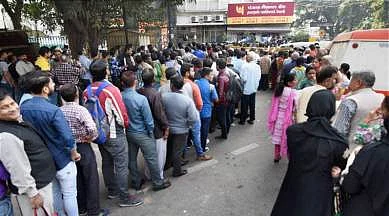Undeclared ‘Emergency’ today is more sinister and more dangerous
Opposition pulverised by central agencies, media crawling and judiciary more loyal than the loyalists, self-censorship in vogue and ruling regime even more ruthless, the ‘Emergency’ today is insidious

The declaration of the Emergency on June 25, 1975 plummeted India into its biggest Constitutional crisis since we had fought for and won Independence from British colonial rule.
A common taunt from the pro-RSS brigade to liberal journalists today is “what were you doing then, why didn’t you do anything, you were in favour of the suspension of democratic rights” and so on.
I was 12 years old at the time. I’m not making excuses. But I do remember the arguments at home. So many battles with my parents’ friends who were overjoyed that trains ran on time, people were more disciplined and so on. The same sort of people who nowadays deplore “too much democracy” (o, wait, are those BJP people?) and who crave for life under the Communist Party of China where if you protest against environmental damage or in favour of human rights, you are crushed by bulldozers and army tanks.
Just about everything that could be wrong with the Emergency was wrong with it.
Misuse of power, suspension of fundamental rights, assaults on personal liberties, a media which succumbed, a judiciary about which the less said the better, powerful officials who ignored their training and allegiance to the Constitution, a vast group of fascist forces … anything that sounds familiar in today’s India?
Anyway, let’s not get ahead of ourselves.
Something remarkable also happened as India struggled with the dichotomy of “increased discipline” and no democracy.
A popular movement grew. Jayaprakash Narayan was joined by unlikely groups, often at loggerheads with each other, but together for a common cause. People from within Indira Gandhi’s Congress, the left, the Hindutva right which did not really have much of a presence at the time, the middle, socialists, students, social workers, the extreme left, the people themselves fought together.
Meanwhile in the name of progress, apart from the fact that it took suspension of democratic rights for government officials to get to work on time – this really makes the middle classes overjoyed – people were forcibly sterilised and slums were demolished. Censors sat in newspaper offices redacting news and information.
These travesties were enough to make all these opposition groups set aside their differences and work together. A common goal. There must have been egos and fights. In fact, as we saw later, after the Emergency was lifted and this motley group was voted to power, the Janata government could not sustain itself for a full term. But it restored democracy.
After all that we as a nation have gone through over the last eight years, from the destruction of the economy to constant attacks on fundamental rights to assaults on India’s religious minorities to court decisions which appear to bolster the collapse of our democratic system, there are only a few voices which feel the need to speak out.
India’s many opposition parties cannot find it in themselves to pay more than lip service to the need for unity. Maybe power, ego and lack of money or the promise of money for inaction, apparently stop them from the final push.
It is true that the ruling regime uses every single loophole in our laws to skirt at the edges of legality. And, in a far more sinister manner, every single agency at its disposal is used to threaten and silence anyone who opposes them.

Any other government would have fallen after demonetisation, after GST, after the collapse of small and medium enterprises, after the Pegasus revelations, after the Panama papers, after the CAA, NPR and NRC acts, after the abrogation of Article 370, after constant attempts to brazenly buy and sell politicians to get to power, after the pathetic handling of the Covid-19 pandemic, after the farmers’ protests…
Instead, the ruling regime has only got stronger and stronger and won elections again and again.
It has used state agencies like the ED, the CBI and NIA to go after anyone who questions them or wherever the regime senses a threat. It has filled its own coffers through opaque electoral funding laws and open funding from spineless corporates and from the RSS formidable fund-raising efforts in the West.
We know all this.
We know what we’re up against.
We know how voices are silenced and people are intimidated.
Some who can afford it are just leaving India.
Others send their children out.
This is the Emergency of our times.
There is no official censor.
There is gleeful self-censorship.
And opposition which cannot find that push.
What will it take?
(The writer is an independent columnist and commentator. Views are personal)
Follow us on: Facebook, Twitter, Google News, Instagram
Join our official telegram channel (@nationalherald) and stay updated with the latest headlines